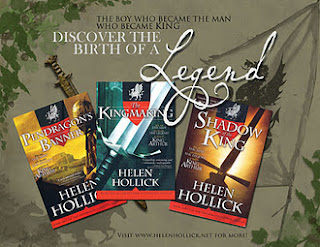 |
| Welcome to my Blog! Wander through wonderful worlds real and fictional, meet interesting people, visit exciting places and find a few good books to enjoy along the way! |
As a reader, I love a series. When I was a child I would raid my mother’s bookcase and gorge myself on the twelve Poldark novels, the four Cazalet Chronicles, and even the thrilling three books that formed the disturbingly grown-up Forsyte Saga. But when I came to write my own historical fiction, I didn’t dare dream of writing a whole series: just the one novel seemed an almost unattainable goal. And after four years of writing, in 2013 I self-published that novel: Fatal Forgery – an historical crime fiction based on the true story of a banker who stole all the money from his own London bank in 1824.
But I made the fatal mistake of falling in love with my own hero (not the banker, but rather the magistrates’ constable who arrested him) and I just had to write another story for him. And then a third, and on it went until I had written seven books featuring my beloved Sam Plank. I had to stop at that point because we had reached 1829, when the Metropolitan Police was created and the magistrates’ constables were put out of work. But what I had created was an accidental series.
 |
| Find out more about Sam Plank in a previous post here |
This time round, it’s different. I have known from the very beginning – before I wrote a single word – that this next venture would be a series of five books, set in the 1820s again, and located in my hometown of Cambridge. The difference this has made to my planning process is enormous. With the Sam Plank series, I would often struggle to remember casual details that I might have mentioned about a character – hair colour, or food preference – and have to re-read whole books just to check. This time, with the Gregory Hardiman series, I have created character biographies right from the start. Of course I add to them as I go along and new details occur to me, but by having a lot of information about a character at my fingertips, I can choose to drip-feed and ration it across the five books. I hope this will encourage people to stick with the series in order to find out more about the characters.
The downside of this approach is that I had to do the most enormous amount of preparation before starting the first book; the upside is that subsequent books should be easier to write, as I will be able to refer to my store of already-chosen information about the characters. Certainly the second in the series – Sizar – took me about two months less to write than the first (Ostler).
My other concern with this new series was the challenge of writing a new narrator, who on the surface of things has a great deal in common with my old narrator. Both are men in their middle years, both are constables (one a magistrates’ constable, the other a university constable), and both tell their stories in the first person singular. And after spending more than a decade with Sam Plank in my head, and being able to hear him speaking in my ear, I was terrified that when I started to tell Gregory Hardiman’s stories, he would sound exactly like Sam! I decided at the outset that there would be key differences. Sam is an urban London, while Gregory is a country boy from Norfolk. Sam has left England only once in his life, while Gregory has been around the globe and spent longer away from England than in it. Sam is happily married while Gregory is not. But facts are not enough; I can’t constantly refer to them. So I had to give Gregory something more, and I hit on two devices. First, he is obsessed with words and keeps a vocabulary book with him so that he can learn new ones whenever possible. And second, he talks directly to the reader. I am relieved to hear from readers of both series that the two men sound very different to them – and as I am having audiobooks created in both series, I have certainly been very careful to choose two narrators who sound very different.
That said, it is important to me not to be too rigid with my planning. Yes, I have character biographies for the main players – but I have found that they have a habit of going their own way. I can still remember the shivers I felt when I was writing the second Sam Plank book – The Man in the Canary Waistcoat – and the story of Sam’s childhood and how he ended up so interested in finance and justice came to me fully formed, as though Sam himself was telling me. And true to form, things are happening in the Gregory Hardiman series that I had not predicted.
Romance is brewing for Gregory’s landlady, for instance, and I initially had her down as a confirmed and determined widow. Gregory has revealed a dry sense of humour. And the camaraderie between the “horsemen” – as Cambridge’s ostlers at all the local inns called themselves – is proving very important, and will help enormously with the plot of one of the future books.
Finally, when you are writing a series, the completion of each book is a bittersweet experience. I am delighted (and relieved) to have finished Sizar, and can’t wait to hear what readers think. (Ah yes, there’s another “series concern”: will people like the main character enough to want to read more than one book about them?) But I am already gearing up for Gregory 3, as the new book will be called until its title becomes apparent: I’m checking my database of significant events and weather patterns in 1827, and treating myself to a few days in the library reading old copies of the Cambridge Chronicle newspaper. Gregory may have wrapped up one adventure, but we’re both keen to get started on another.
 |
| Gregory Hardiman's Cambridge |
Sizar – the second Cambridge Hardiman Mystery – will be published on 5 December 2024. It will be available in paperback and various e-book formats. The official launch party is being held on Thursday 5 December at 6.30pm at Bodies in the Bookshop, 1A Botolph Lane, Cambridge, CB2 3RD – tickets to the event are free but must be reserved in advance from the bookshop as space is limited (info@bodiesinthebookshop.co.uk ).
Personal links
ABOUT THE AUTHOR
When financial crime was a deadly business...
I have been in love with words ever since I realised, at age three, that those squiggles on the page actually meant something. I edited the school newspaper (is here the place to confess that I was also the author of the section giving all the gossip on who was going out with whom?) and did lots more reading and writing at university (where, of course, I studied English).
For twenty-five years I ran my own anti-money laundering consultancy, which gave me almost limitless opportunity to write about my very favourite subject: money laundering. And the obsession with understanding the mechanics and motivations of financial crime has only grown.
I have spent years haunting the streets of Regency London, in the company of magistrates' constable Sam Plank. He is the narrator of my series of seven historical financial crime novels set in consecutive years in the 1820s - just before Victoria came to the throne, and in the policing period after the Bow Street Runners and before the Metropolitan Police.
The fourth Sam Plank novel - "Portraits of Pretence" - was given the "Book of the Year 2017" award by influential book review website Discovering Diamonds. And the fifth - "Faith, Hope and Trickery" - was shortlisted for the Selfies Award 2019.
And I have published "Ostler" - the first in a new five-book series set in Cambridge in the 1820s, narrated by a university constable, Gregory Hardiman.
Please follow my profile for important updates - and thank you for your reviews!
 |
| My Thoughts |
It is often difficult getting into a new series by a respected and talented author, especially when a previous series has been so well written and much loved. No problem here for Susan Grossey, though, for if this, the second in her Cambridge Hardiman Mysteries is anything to go by, she's definitely on to a winning streak.
I didn't think Ms Grossey could come up with another fictional character to match her Constable Sam Plank, but Gregory Hardiman, ostler, keen word-collector and University Constable has surpassed Sam. Both are very different characters living in near the same era but solving crimes and mysteries of very different sorts, in very different ways and in very different locations: Sam in London, Gregory in the University town of early 1800s Cambridge. And the treat for the reader is not just in the superb writing, intriguing plot and believable characters, the history of Cambridge and its academia is as fascinating as the plot.
The sign of a good read is to want to know what happens next so you keep turning the pages, to totally believe that what you are reading is fact not fiction, the characters are 100% believable in what they say, do and act. and to reach the last page thoroughly satisfied and having learned something new along the way. Without hesitation, Sizar ticks all the boxes and is a very good read indeed.
***** 5 STARS
*
Follow Helen On:
Facebook: https://www.facebook.com/helen.hollick
Bluesky: @HelenHollick - http://helenhollick.bsky.social/
(and I'm on Twitter @HelenHollick but for marketing only)
*
You might also like
books written by Helen Hollick
Website: https://helenhollick.net/
Amazon Author Page: https://viewauthor.at/HelenHollick
*
THE SAXON SERIES
 |
| The story of the events that led to The Battle of Hastings in 1066 Harold the King (UK edition) I Am The Chosen King (US edition) 1066 Turned Upside Down an anthology of 'What If'' tales |
*
KING ARTHUR
The Pendragon's Banner Trilogy
The Boy Who became a Man:
Who became a King:
Who became a Legend...
*
*
 |
| Amazon: FREE ebook! |
*
*
NON-FICTION
*
 | |
|
*































